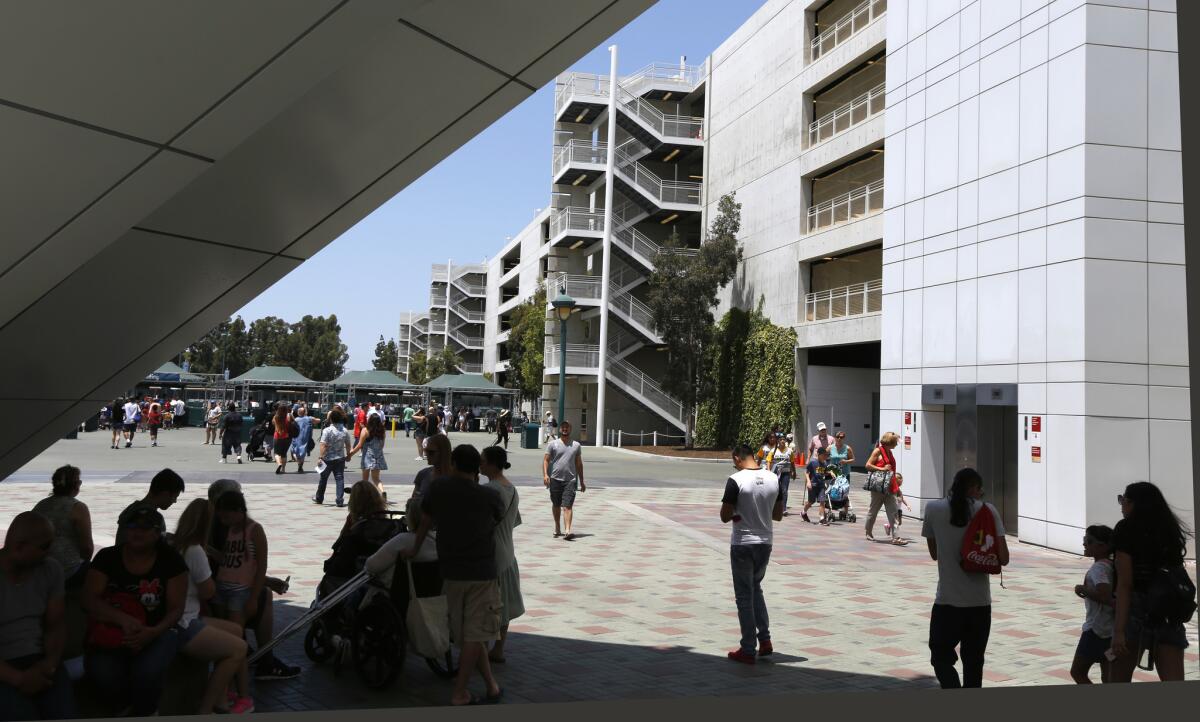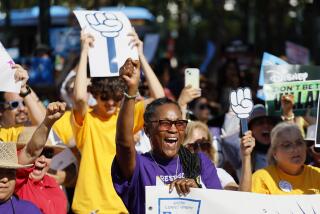Is the Disneyland Resort getting a city subsidy? Workers’ lawsuit pushes court to decide

A group of Disneyland workers has filed a class-action lawsuit claiming the Anaheim resort is violating a 2018 ballot measure by failing to pay its workers a living wage, an accusation that could force the court to settle a yearlong dispute between organized labor and Walt Disney Co.
The lawsuit filed in Orange County Superior Court in Santa Ana alleges that the Disneyland Resort has violated the requirements of Measure L, which mandates that any hospitality business located in Anaheim’s resort district and benefiting from a city subsidy must pay workers a minimum of $15 an hour. The ballot measure was backed by Unite Here Local 11, which represents hotel and restaurant workers at the resort.
In the lawsuit, five resort workers argue that the Disneyland Resort is benefiting from a city subsidy because Anaheim is using tax dollars to pay off construction bonds for a six-story parking garage located in the resort.
Most of those taxes come from Disney but some come from bed taxes from hotels throughout the city. Disney collects most of the parking revenue from the garage — more than $35 million a year. Once the 40-year bond is paid off, the city has agreed to transfer ownership of the garage to the resort.
“Our position is that this is clearly a subsidy,” said Randy Renick, one of the plaintiffs’ attorneys.
But the city of Anaheim and the Disneyland Resort have argued that the 1996 agreement to build the $108-million parking garage does not fit the definition of a subsidy.
“We have yet to see the lawsuit, but the union coalition is well aware that the [Anaheim] city attorney has previously looked at the issue and clearly stated that Measure L does not apply to the Disneyland Resort,” Disneyland spokeswoman Liz Jaeger said.
Anaheim City Atty. Robert Fabela issued an opinion in October 2018 saying that “although there are many moving parts to the bond transaction, it does not appear to incorporate a direct city subsidy.”
A few hours after the gates swing open at Disneyland and Disney California Adventure, the cars are still pouring into the massive 10,241-space parking garage.
Legal experts who have read the ballot measure and the finance agreement have said in the past that the legal question is not so clear-cut and a court may have to decide the definition of a city subsidy based on the intent of those who brought Measure L to Anaheim voters last year.
Michael Thom, an assistant professor in public policy at USC and an expert on public finance and tax incentives, said last year that the financing agreement for the parking garage does not appear to be a subsidy because it does not return any taxes directly to the Disneyland Resort but instead uses them to pay off the construction bond.
The lawsuit also names subcontractors and lessees for Disney, Sodexo and SodexoMagic, which the lawsuit says operate restaurants and coffee shops in the resort.
One of the plaintiffs, Kathleen Grace, works as a barista for a Starbucks coffee shop operated by Sodexo in the resort. The other plaintiffs work for Disney as a hotel bell hop, a cashier, a makeup artist and a banquet event server.
“I love Anaheim and that is why I came together with my fellow plaintiffs to make sure that every resort worker gets paid the living wage we deserve,” Grace said during a news conference Monday.
Measure L, which was approved by voters in November 2018, requires hospitality businesses that accept a city subsidy to pay a minimum of $15 an hour, starting Jan. 1, 2019, with salaries rising $1 an hour every Jan. 1 until 2022. Once the wages reach $18 an hour, annual raises would then be tied to the cost of living.
The lawsuit states that more than 400 current and former Disneyland Resort employees could be a party to the action.
The judge assigned to the case would first have to certify that the case can proceed as a class-action lawsuit. If the lawsuit succeeds, Renick said, the more than 400 current and former employees collectively would be owed millions of dollars in back wages.
Disney representatives have noted that all non-tipped employees of the resort already earn a minimum of $15 an hour, along with the ability to earn overtime pay.
Before the ballot measure was adopted last year, Disney was clearly a target of Measure L because the Disneyland Resort had a deal with Anaheim in which the resort would be reimbursed $267 million in hotel taxes if Disney agreed to build a luxury hotel in the resort. Also, Disney had a second agreement in which Anaheim agreed not to adopt any entertainment taxes for 30 years in exchange for the company’s promise to invest $1 billion in the resort.
But months before Anaheim voters went to the polls to vote on Measure L, the president of the Disneyland Resort requested Anaheim nullify both agreements, saying the tax breaks were causing strife with the city. After the Anaheim City Council voted to end the two tax-subsidy deals, it appeared that Measure L would no longer apply to the Disneyland Resort.
But the union representing Disneyland Resort workers has continued to argue that the deal to finance the parking garage fits the description of a city subsidy.
“This is an important case,” Renick said. “Disney was able to take millions of dollars in subsidies and not take responsibility for paying a living wage.”
More to Read
Inside the business of entertainment
The Wide Shot brings you news, analysis and insights on everything from streaming wars to production — and what it all means for the future.
You may occasionally receive promotional content from the Los Angeles Times.











